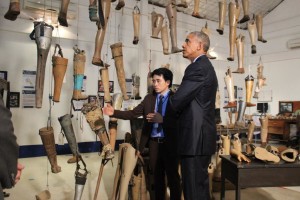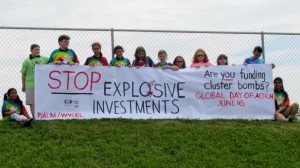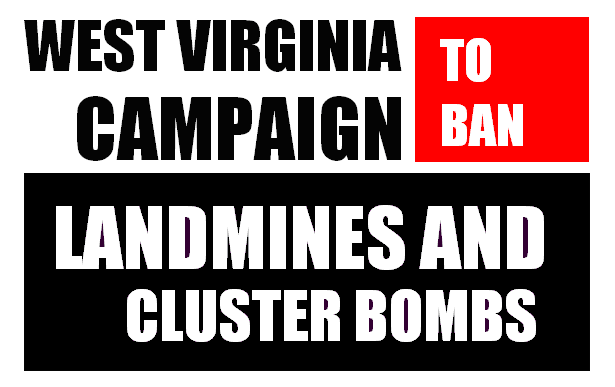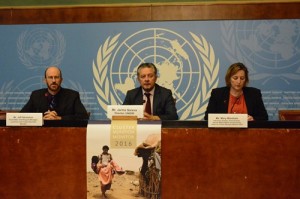
Deadly Attacks in Syria as Treaty Members Meet
(Geneva) – Nations attending the annual meeting of the international treaty banning cluster munitions on September 7, 2016, condemned the continued use of these weapons in Syria, Human Rights Watch said today. During the three-day meeting in Geneva, first responders, local activists, and journalists reported at least eight cluster munition attacks in Syria, some of which, they reported, killed and injured civilians,including children.
The United States did not attend the meeting, which took place at the same time as President Barack Obama’s historic visit to Laos, but two developments in the past week show the ever-growing power of the Convention on Cluster Munitions. The US, which is not a treaty member, announced it will provide US$90 million over three years to facilitate clearance efforts in Laos, and the last US producer of cluster munitions, Textron Systems, announced it is getting out of the business.
“We are outraged that yet more civilians in Syria lost their lives to cluster munitions this week as countries were meeting to discuss the international ban on these weapons,” said Steve Goose, arms director at Human Rights Watch and chair of the Cluster Munition Coalition, an international group of organizations working to end the use of the weapons. “Words won’t bring back those who have died, but they do send a strong message to cluster munition users that they are on the wrong side of humanity.”
The 55 states parties participating in the sixth annual meeting of the Convention on Cluster Munitions adopted a declaration in which they “condemn any use by any actor.” The nations said: “We are deeply concerned by any and all allegations, reports or documented evidence of the use of cluster munitions, most notably in Syria and Yemen in the past year.”
Numerous governments, as well as the UN, International Committee of the Red Cross, and the Cluster Munition Coalition, have condemned the use of cluster munitions in the past year in Syria, by the joint Syrian-Russian military operation, and in Yemen by a coalition of countries led by Saudi Arabia. None of these countries are part of the treaty.
“We are outraged that yet more civilians in Syria lost their lives to cluster munitions this week as countries were meeting to discuss the international ban on these weapons” Steve Goose Arms Director at Human Rights Watch
On September 6, Syria Civil Defense, a search-and-rescue volunteer group that operates in opposition-held areas, addressed a briefing for delegates attending the meeting to explain how it is clearing unexploded submunitions and other explosive remnants of war. That same day, two of its volunteers were killed and two wounded in a reported cluster munition attack as they were responding to an earlier air attack on the town of Khan Shaykhoun in Idlib governorate.
Cluster munitions pose an immediate threat to civilians by scattering multiple submunitions or bomblets over a wide area. Many fail to detonate and leave unexploded submunitions that continue to pose a threat long after a conflict ends.
The treaty has been signed by 119 countries, and 100 of them have ratified it. During the meeting, Madagascar, Namibia, and Nigeria said they would ratify soon. France, Germany, and Italy announced that they have completed destruction of their stockpiles of cluster munitions.
Twenty countries that have not signed the treaty attended the conference as observers including Argentina, China, Finland, Greece, Libya, Oman, Qatar, Serbia, Singapore, Sri Lanka, Sudan, and Turkey.

© 2016 Khamchanh Phetsouphan
President Obama’s Laos visit highlighted that country’s continued suffering from cluster munitions used by the US decades ago, particularly unexploded submunitions – called “bombies” by locals – as well as other explosive remnants of war. During the visit, President Obama met with cluster bomb victims and announced a significant increase of funds to help clear and destroy explosive remnants of war. The president did not, however, address the question of when the US will end the production, transfer, use, and stockpiling of cluster munitions.
On August 30 Textron Systems announced that it has decided to stop its production of sensor fuzed weapons, which are prohibited by the Convention on Cluster Munitions. Textron was the last US manufacturer of cluster munitions, so this decision clears the path for the US to end production, transfer, and use of all cluster munitions, which would enable it to join the treaty.

“More funding for clearance and victims is essential, but it should be accompanied by a commitment to relinquish cluster munitions, so that the US can join the international ban treaty,” Goose said.
Germany’s Ambassador Michael Biontino has been elected president of the next annual meeting of the Convention on Cluster Munitions.
The convention obliges states parties to adopt national implementation measures, including legislation, to carry out the provisions of the treaty, but only 27 countries have done so. Human Rights Watch issued an updated report on September 5, outlining key elements that should be included in strong legislation to implement the treaty.
Human Rights Watch is a co-founder of the international Cluster Munition Coalition, and Goose served as the head of the coalition’s delegation at the meeting. Human Rights Watch gave presentations for delegates at briefings about Cluster Munition Monitor 2016, the coalition’s annual report on the status of the treaty; how to respond to new use in Syria; and on the use of explosive weapons in populated areas.
*Article from HUMAN RIGHTS WATCH
SEPTEMBER 1ST
The Cluster Munition Monitor 2016 was launched at the United Nations Office in Geneva, hosted by the United Nations Institute for Disarmament Research (UNIDIR). In parallel the report is being released by national campaigns in several countries.
The 2016 report covers global developments in ban policy, survey and clearance of cluster munition remnants, casualties and victim assistance. The complete report and press release and major findings (in English, French, Spanish and Arabic) can be downloaded from the Monitor website.
After many years of advocacy by the Cluster Munition Coalition, Cluster Munition Coalition-US and other campaign members, yesterday, Textron, one of the largest producers of globally banned cluster munitions announced it will stop producing cluster munitions. Textron, a US company has produced CBU-105 Sensor Fuzed Weapon (SFW), which has been transferred to Saudi Arabia and used in Yemen over the past one year. Textron has been the only cluster munitions producer in the US.
The international community including 100 States Parties, 19 signatories to the Convention on Cluster Munitions will come together for the Sixth Meeting of States Parties to the convention in Geneva September 5th.

